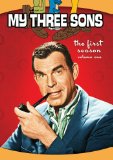| Reviews & Columns |
|
Reviews DVD TV on DVD Blu-ray 4K UHD International DVDs In Theaters Reviews by Studio Video Games Features Collector Series DVDs Easter Egg Database Interviews DVD Talk Radio Feature Articles Columns Anime Talk DVD Savant Horror DVDs The M.O.D. Squad Art House HD Talk Silent DVD
|
DVD Talk Forum |
|
|
| Resources |
|
DVD Price Search Customer Service #'s RCE Info Links |
|
Columns
|
|
|
My Three Sons: The First Season, Volume One
Yes. I know they changed the music. I've deliberately put off writing this review for some time now, because I feel the situation surrounding CBS DVD and Paramount's release of My Three Sons - The First Season, Volume One would put any reviewer in an almost impossible situation. I don't know if My Three Sons carries a whole lot of weight in the pop culture conscience of an average TV viewer today, but I can say, after watching these first 18 black and white episodes from the premiere 1960-1961 season, that these early shows are something quite rare and special indeed - which makes it all the more hard to recommend buying this particular DVD version when almost all of the music has been re-composed for the episodes (except, of course, for the iconic opening sax theme by Frank DeVol). Do we throw the baby out with the bath water, and say, "If a single frame or music cue is altered, we will not watch and we will not buy," or do we compromise, and try and enjoy what is there? It's an impossible argument either way, and one that vintage TV lovers wrestle with every time a release like My Three Sons - The First Season, Volume One comes down the pike.
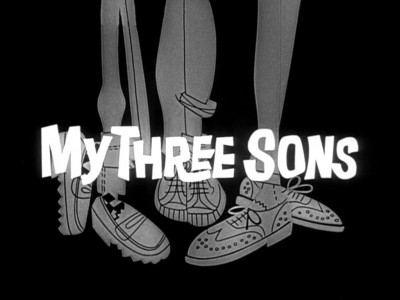
My Three Sons was created by Leave it To Beaver writer George Tibbles and producer Don Fedderson (who would go on to create the equally brilliant and unfairly maligned Family Affair), in partnership with Hollywood leading man Fred MacMurray (who owned half of the series) and Chevrolet, the show's sponsor (the end credits of the episodes on this disc carry "commercials" for 1960 Chevys). MacMurray, who at one point during the early forties was the highest paid actor in Hollywood (a fact that many fans don't know who only concentrate on his later TV and Disney resumes), had by 1959 settled into a solid if unremarkable leading actor career in lesser-tier westerns and adventure films, while doing stellar, Oscar-worthy work as a supporting actor in films like The Caine Mutiny and the soon-to-be-released The Apartment (interestingly, both of which show MacMurray as a cowardly, vile rat). But in 1959, out of the four films that MacMurray had in release, a low-budget, silly Disney live-action comedy, The Shaggy Dog, became one of the highest grossers of the year-end box office, and certainly one of the biggest hits of MacMurray's entire career. The lesson of the success of that little Disney comedy, which was shot and which looked liked so many of the sitcoms on TV at the time, couldn't have been lost on MacMurray when the opportunity to star in My Three Sons came along that same year. The economic rewards for a successful TV series at that time (particularly when you owned half the series) were potentially enormous (Lucy and Desi had bought RKO with the spare cash they had lying around), but the demands on the star's time were equally impressive.
Faced with the prospect of shooting a full season of episodes (back when a full season meant 30-plus shows!), MacMurray, according to some reports, sought out the advice of TV's most successful sitcom dad at the time, Robert Young, from CBS' Father Knows Best, who clued MacMurray in on the realities of a grueling, seemingly non-stop, year-long TV shooting schedule (which must have been an eye-opener to MacMurray, a film actor, who was used to coming on a set, shooting for a few weeks or months, and scooting off to a new location or back to his Hollywood home). In what now has famously become known as "the MacMurray Method," MacMurray, a really sharp businessman as well as a terrific actor (MacMurray died one of the richest actors in Hollywood) stipulated in his contract that he would only work 65 non-consecutive days out of the year on My Three Sons. MacMurray would make himself available in the spring for a month to shoot whatever material the writers and producers had for him, and then take off on vacation for the summer. He would return in the Fall, and finish any remaining scripts, as well as necessary pick-up shots (for continuity), ending his commitment to the show before Thanksgiving. This rather remarkable production schedule certainly minimized the time notoriously cost-conscious MacMurray had to spend on his series, but evidently, it caused a nightmare for the writers and producers who only had MacMurray for those 65 days: if they couldn't fashion the episodes out of the footage they had, they were out of luck.
Not only did this kind of shooting eliminate "shooting in sequence" (for TV, shooting one full, complete episode per week), it created enormous logistical problems for the producers who had to shuffle actors back and forth over intervening months to pick up the simplest shots to complete an episode. As well, the writers were often-times faced with incomplete scripts. MacMurray would be shot doing a little bit of non-specific "business" or delivering a generic monologue on a generalized subject, which the writers would then fashion into a complete script, months later. As for the other actors, concerning MacMurray's "Method," well...tough. Often-times, MacMurray might spend days alone on the set, performing countless reaction shots (entirely out of context and sequence) or delivering endless lines that were to be inserted later into episodes, all of which would then be reconfigured into footage shot months later (or before) with actors reacting to a non-existent MacMurray, who might have been golfing at that moment, or shooting one of his many subsequent Disney films during his vacation and hiatus from the show. Of course, the "MacMurray Method" isn't particularly novel in its creation (it is, after all, how most feature films were and are shot, and a method probably most comfortable and familiar to the film actor MacMurray), but its introduction to TV production methods was certainly innovative.
All of which makes the artistic accomplishments of these first 18 episodes in the My Three Sons - The First Season, Volume One all the more remarkable. I would imagine that most TV fans are more familiar with the later color episodes of My Three Sons, when the show moved to CBS (ABC refused/was unable to foot the bill for the series' move to color), and co-star William Demarest joined the cast as Uncle Charley O'Casey, the brother of Michael Francis "Bub" O'Casey (William Frawley), who left/was fired from the show in 1965. My Three Sons was finally winding up its long run in the early 70s when I was little, and I remember watching the show and feeling, even then, that there was something "off," something "empty" about the entire feel of the series, which seemed hermetically sealed off from scene-to-scene (perhaps the "MacMurray Method" effect), a feeling reinforced when I catch an occasional color episode today. Despite the ever-growing cast of the later seasons, when wives and girlfriends and new little kids were introduced with abandon, the later seasons always have a kind of lonely, still, airless feel to them.

Not so for these remarkable episodes, though, in this first half of the first season. My Three Sons basic premise follows the suburban adventures of the Douglas family, minus one very important part of the traditional American sitcom nuclear family: the mother. Steve Douglas (Fred MacMurray), a former pilot and now aviation and missile engineer for the Universal Research and Development Company, has been a widower for six years. Living in a comfortable but not ostentatious middle-class neighborhood in a comfortable, not ostentatious Midwestern suburb, Steve's life revolves around either working long, hard hours not only at his office but often times late into the night at his bedroom drafting table, or trying to solve the problems a busy father might have rasing three rambunctious, healthy American boys. Mike (Tim Considine, a Disney veteran who co-starred with MacMurray in the smash hit, The Shaggy Dog), the eldest son at 18, is facing the rather frightening prospect of leaving behind his comfortable high school days, where he's a handsome and popular student, for the prospect of college, while negotiating his way through his relationship with steady girlfriend (who lives right next door, of course), Jean Pearson (Cynthia Pepper). Robbie Douglas (Don Grady), at the awkward age of 14, is trying to find his place as the middle child in this noisy group, often times competing with Mike for Steve's approval, while still reconciling himself to the fact that he's not a boy anymore, but not yet a man, either. And finally, little Chip Douglas (Stanley Livingston), seven years old and full of energy, is just trying to negotiate his way around this relatively new world in general. Not at all a traditional (and cliched) sitcom "smartass," Chip is a genuinely funny little boy with a quirky outlook on the events that unfold in the Douglas house - a viewpoint that exasperates his older brothers at times. Helping Steve watch over the boys is Michael Francis "Bub" O'Casey (William Frawley), Steve's father-in-law, who gave up his life running a movie theatre to come live with Steve and the boys, acting as a surrogate "mother" who cooks, cleans, attends PTA meetings and tea socials, and who provides gruff, no-nonsense (but loving) "front-line sergeant" discipline for the boys when calm, cool, collected "general" Steve is busy at work.
Increasingly, as I watch first-hand more and more episodes of classic TV, I'm convinced there is a treasure trove of brilliance in hundreds of hours of early network TV that has been unfairly dismissed as "junk" by critics who are either deliberating misreading these shows (usually for political reasons) or who literally haven't seen them (and who just regurgitate the same cliches they've read in other writings without going to the original sources). And My Three Sons, at least these first 18 episodes, fits comfortably within that trove. Having only seen the later color episodes, I never thought of My Three Sons as anything more than a pleasant, if unremarkable, suburban sitcom starring a heavy-hitting Hollywood star. But after watching these first outings, I was suitably impressed with these rather remarkable episodes. Network TV series, just like films, are a collaborative effort, but it must be noted that producer and director Peter Tewksbury deserves the lion's share of the credit for these beautifully crafted episodes. Directing every single episode of this first season (a sizeable logistical feat, even had the episodes turned out to be mediocre - which they most certainly are not), Tewksbury displays a fluid camera style (and, by design I would imagine, the footage for seamless editing) that resembles a particularly accomplished feature film, not a rushed, weekly TV series.
Tewksbury's style (with the aid, of course, of excellent screenplays by a roster of fine scribes) here encompasses both surprisingly straight drama, as well as a predilection for comedic set-pieces that are as beautifully crafted as his drama scenes are emotionally resonant. From a purely comedic standpoint, the Lonesome George episode, where comedian George Gobel visits the Douglas house, is an excellent example of Tewksbury's felicity with blocking his actors in a dreamy, fluid style that would do justice to a big-screen effort. The episode's premise is simple: George, invited to stay at the house when Steve is away, pads around the house at night, getting a snack, while Steve, unexpectedly returned home, walks around the house, as well, as both men are convinced that someone keeps missing them in the hallways and rooms of the Douglas house. Tewksbury's blocking is scrupulously funny and precise, building the level of suspense in the episode to a fine point, with the payoff of having both men wind up in Steve's bed (Gobel is, as always, very funny - and surprisingly good, too, in a somewhat sad scene where he contemplates his fate as a recognizable star). There are many such funny "set piece" moments in these first 18 episodes, including Adjust or Bust, where Steve spends much of the episode trying to get home by bus, car and bicycle; Lady Engineer, where Tewksbury works out a complicated office trek for Steve as he tries to track down a pretty engineer; Mike's Brother, where Steve has a great extended bit where he tries to park his station wagon in a crowded garage; and Domestic Trouble, where Steve winds up the episode hysterically trying to get comfortable in bed, his blanket too short for his tall frame.
And while Tewksbury can deliver an expertly crafted comedic scene, he's equally adept at more innovative moments in this first season. The delicious Countdown starts with an almost documentary-style opening showing the Douglases slowly waking up for a typical day, counterpointed by a televised countdown of a rocket launch, with the launch's commentary synched up - and ironically commenting on - the Douglases' movements and actions. It's a exquisite episode, full of funny, telling moments (I love it when the commentator says there may be "some turbulence up there," while Tewksbury focuses on a ticked-off Robbie's head, who's debating whether or not to get into a fight with one of his brothers). In Brotherly Love, Tewksbury shoots these amazing close-ups of Don Grady, looking positively primitive in his hatred and rage, as he waits in the bushes to jump his brother who he believes has stolen his girlfriend (jungle drums beat ominously on the soundtrack, but I don't know if these have been added with the new musical tracks). In Raft on the River, Tewksbury manages to conjure up some frightening moments in the final scenes as Steve and Chip, increasingly worried that their backyard camping trip is going to be interrupted by some kind of violent force/criminal, gradually freak out, culminating in a truly scary image of something coming towards their clubhouse raft. And in Spring Will Be a Little Late, working from a finely crafted script by Jack Laird, Tewksbury delivers up a strange, wonderful episode dealing with Robbie's gradual maturing with girls, as he has an intense encounter with potential girlfriend "Pig" (Marta Kristen, who's excellent in this scene, bringing real terror to Robbie's eyes when she flips out), and then suffers, along with his family, with weird nightmares. These overt, Freudian dreams, full of outright rage and hatred, as well as guilt, are astonishing little vignettes. Steve, who actually daydreams his askew scenario, sees his sons as silent zombies, sitting at the breakfast table in an arranged parody of the very sitcoms in which My Three Sons belongs. Chip dreams of his father, shot from menacing low angles, throwing him out of his safe, suburban home (and chaining the door shut), while Mike's (the most disturbing of the group) sees Steve chained up while Mike, filled with seething anger, calls over and over again for Steve to be devoured by unseen animals ("He's on his knees! "We've got him!"). It's an extremely disturbing moment, echoed later during Mike's waking hours when he hears those words again in his head when he finds himself again at odds with his father - a moment of pure Oedipal hatred directed at a beloved sitcom dad, and a most rare occurrence in early 1960s TV.
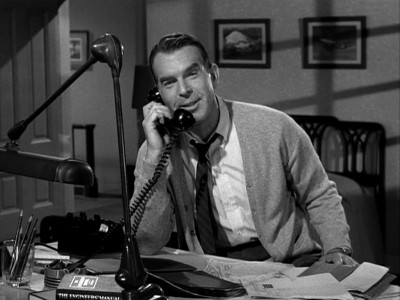
Outside of the startling cinematic innovations he brings to these 18 episodes, as well as his extended, exquisite comedy scenes, Tewksbury shows an assured hand on the straightforward drama that routinely pops up in these episodes. I'm not sure I've ever seen, on a vintage TV sitcom from this era, the believable, raw emotion of Steve shouting at Bub to "shut up!" in Brotherly Love (MacMurray gets to show a flash of his expert "rat bastard" temper here, as Frawley believably looks shook up at the reprimand), while the "love" scenes in Lady Engineer have a nicely tempoed clarity that again showcase MacMurray's considerable dramatic skills. Frequently in My Three Sons, Steve gets a chance to discuss the boys' actions in various situations (the results of which invariably cause friction and even bigger problems), and MacMurray's quiet authority is given an equally quiet, straight-ahead framework when called for by Tewksbury. And a realistic framework, as well, considering how often TV sitcoms from this period are dismissed as fantasy fluff. The Douglas boys, never falling into sitcom cliche "types," behave like ordinary American boys: they fight, they bicker, they have fun together, they become self-absorbed in their own problems, they put off doing their chores, they complain when things don't go their way (I love it when Steve lays it out for a complaining Mike, who's embarrassed by Bub's behavior, detailing how insensitive and ungrateful Mike is being, considering how much Bub has given up to be there for the boys). In several episodes, it's clear that Steve wants to talk to the boys and give them good advice about their troubles, but the boys aren't really listening; they're wrapped up in their own world with Steve realizing they're going to have to solve their own problems (Steve does this several times, as well, not listening to the boys when they're trying to tell him something important). For a sitcom that's often referred to disparagingly as "Disneyesque" (a vague, facile pejorative, at best), My Three Sons is a most remarkably complex American sitcom.
Which brings us to this release of Paramount's My Three Sons discs. There has been a bit of small firestorm on quite a few DVD websites concerning My Three Sons, yet another CBS/Paramount DVD release of a vintage TV show that features a newly-composed score, due to prohibitive music release fees (or possibly the threat of copyright infringement for the studio who may not own the exclusive rights to the music, and thus may face exorbitant legal penalties if the product was released). I've been on both sides of this argument concerning edited or altered DVD releases of TV shows, depending on the product (and on my own evolving view on this matter). For a small group of vintage TV fans, there can be no small allowances made for such egregious editing/alterations; the studios are artistic philistines who savage the art which is in their care, and all for a measly buck. I can understand their anger, and I sympathize. I feel the same way about the product itself; I hate the fact that music for most of the My Three Sons episodes have been re-scored. I don't find the new music particularly well-composed (but I also don't find it exceedingly bad and intrusive). It simply "alters" the product for the worse. And I wish that wasn't the case. In a perfect world, this wouldn't happen (and importantly, other studios seem to be able to release product with music largely intact, while Paramount has deservedly gotten a pretty piss-poor reputation now, unfortunately -- because the video element of their releases are usually top-shelf - for their repeated altered releases).
That being said, I'm not going to throw the baby out with the bath water for My Three Sons, simply because too much of what is here is valuable and entertaining - despite the alterations. Those ready at this point to cry, "Foul," don't bother. I wrestle with these kinds of critical decisions all the time with these releases, and I agonize over them. But ultimately, I have to go back to my own TV-watching past for the answer to these kinds of questions, and the answer that always comes back is, "Life is too short to obsess over what isn't perfect." I grew up watching TV on a crappy little black and white portable, seeing films as diverse as Lawrence of Arabia, Casablanca, The Great Escape, and all the Godzilla films in formats that utterly negated the original intentions of their creators. Films that were shot in color, I saw in black and white. Films that were shot in ultra widescreen, I saw severely cropped on a 19-inch screen. Films that were meant to be seen on a silver screen forty feet high, I saw on a snowy, rabbit-eared cathoray tube TV that only looked good on a rainy day, for some reason. Films that were meant to be seen with full stereophonic sound, I heard through a tinny little 2-inch speaker. And films that were meant to be seen in one uninterrupted sitting, I watched cut up into little 12-minute pieces, interrupted constantly by commercials for dog food and feminine deodorant spray (along with older TV shows, like My Three Sons, that were edited from the start, by being chopped up for syndication running times). None of that stopped me from enjoying these films and TV shows, nor from me seeing the importance of them, nor from experiencing them as "art," if you will. None of that did. So you'll excuse me if, even though I don't like it, I don't think the excising of the interior music for the first 18 episodes of My Three Sons, is the end of the world. It's not right. It's not the way the show should be seen (ironically, those that refuse to watch these altered episodes would gladly do so if they were intact -- but watching them on DVD on a huge monitor, with no commercial interruptions, is also aesthetically "incorrect" in relation to the original experience of show). But there it is. That's how it's presented to us today. I have no idea if it will ever be "reconstructed" the right way - or if indeed, it can ever be reconstructed. What I do know is that there are so many wonderful, deeply funny and emotional, truly innovative moments in this first season of My Three Sons, that they survive the new music. Not to experience them just because we're not getting the episodes in pristine, unaltered condition, is spiting ourselves needlessly. Of course, free will still rules America (hopefully), and the decision to watch these altered My Three Sons episodes resided totally within your own conscience. If you choose not to, I understand. But you'll be missing something wonderful.
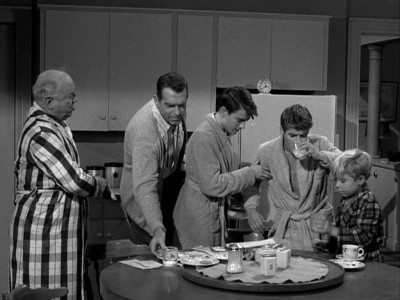
Here are the first 18, one-half hour episodes of the three-disc set, My Three Sons - The First Season, Volume One, as described on the DVD insert:
DISC ONE
Chip Off the Old Block (September 29, 1960)
Matchmaking and romance are in the air for both Steve and his son Chip.
The Little Ragpicker (October 6, 1960)
A nosy neighbor is a little too interested in the comings and goings at the Douglas household.
Bub in the Ointment (October 13, 1960)
Being chief cook, dishwasher and housekeeper to three boys is not fun for a grandfather as Bub soon finds out.
Countdown (October 20, 1960)
The Douglas household is a chaotic cacophony due to lost items.
Brotherly Love (October 27, 1960)
Mike and Robbie cross swords over a girl, which creates a division in the family.
Adjust or Bust (November 3, 1960)
Steve's theory that "life is just a small series of adjustments" is put to the test.
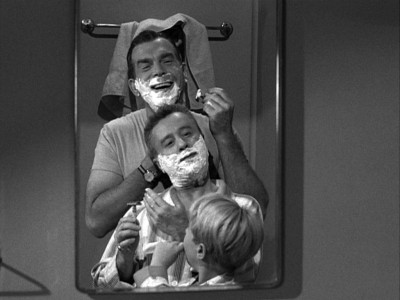
DISC TWO
Lady Engineer (November 10, 1960)
Steve is enamored of his new business associate, an attractive female engineer.
Chip's Harvest (November 17, 1960)
Thanksgiving festivities are threatened when the electricity goes out, while Chip has invited a stranger to the family's dinner.
Raft on the River (November 24, 1960)
Mike and Robbie go camping and leave Chip behind, so Steve tries to cheer him up with a backyard river-rafting camp out.
Lonesome George (December 1, 1960)
TV star George Gobel is invited to dinner by Bub. Steve returns home late from a business trip, only to find a stranger sleeping in his bed.
Spring Will Be a Little Late (December 8, 1960)
Robbie is baffled by his girlfriend's actions, so he sets a plan in motion to test her motives.
My Three Strikers (December 15, 1960)
The Douglas boys call a family meeting at which they demand a raise in their allowances.
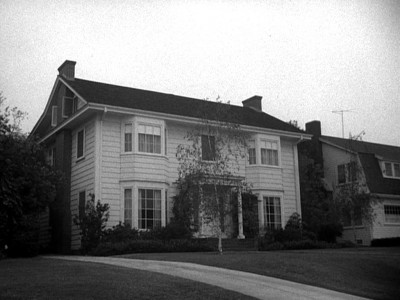
DISC THREE
The Elopement (December 22, 1960)
Mike and the girl next door arouse the suspicions of Steve and Bub when the two are seen leaving with suitcases.
Mike's Brother (December 29, 1960)
Constant comparisons to his brother Mike leave Robbie feeling inferior and angry.
Domestic Trouble (January 5, 1961)
When Bub is suddenly called out of town, Steve seeks an agency to get temporary domestic help - unaware that he may actually be recruiting a wife.
Bub Leaves Home (January 12, 1961)
When Steve invites his second cousin Selena to visit, Bub gets the impression that he isn't really needed.
Mike in a Rush (January 19, 1961)
Mike prepares for college and the question of joining a fraternity is one that complicates his life considerably.
The Bully (January 26, 1961)
Chip taunts the school bully to prove a point and Steve realizes that he has to let Chop solve this problem on his own.
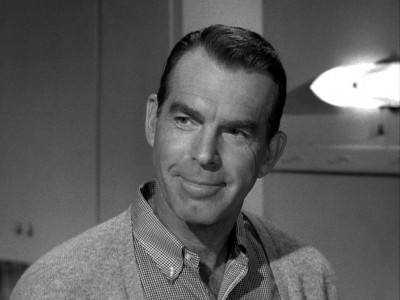
The DVD:
The Video:
Except for one or two instances where I actually saw some fuzz in the gate (it looks like it's on the original transfer material), the full-screen, 1.33:1 black and white transfers for My Three Sons - The First Season, Volume One are up to the usual CBS/Paramount standards - meaning they look quite good, with a sharp image, a balanced gray scale, and a minimum of compression issues.
The Audio:
See above for the music substitutions. As for the audio tracks themselves, the Dolby Digital English mono track is clearly rendered, with all dialogue crisply and cleanly heard. Close-captions are available.
The Extras:
There are no extras for My Three Sons - The First Season, Volume One.
Final Thoughts:
Truly a brilliant sitcom in its early stages, My Three Sons - The First Season, Volume One is a revelation to those of us who only grew up on the color reruns. Producer and director Peter Tewksbury deserves much of the credit for consistently producing an innovative, silky, fluid camera style for the comedy and dramatics here (which are feature-film worthy in their honesty and clarity). I refuse to reject this compromised release of My Three Sons - The First Season, Volume One, because too much of what is here, is truly remarkable. I highly recommend (for those who can stomach the music alterations) My Three Sons - The First Season, Volume One.
Paul Mavis is an internationally published film and television historian, a member of the Online Film Critics Society, and the author of The Espionage Filmography.


|
| Popular Reviews |
| Sponsored Links |
|
|
| Sponsored Links |
|
|
| Release List | Reviews | Shop | Newsletter | Forum | DVD Giveaways | Blu-Ray | Advertise |
|
Copyright 2024 DVDTalk.com All Rights Reserved. Legal Info, Privacy Policy, Terms of Use,
Manage Preferences,
Your Privacy Choices | |||||||









